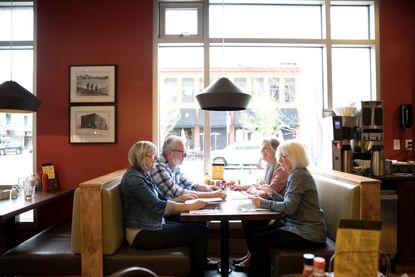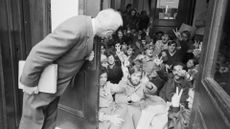Twilight of the early bird dinner
The early bird dinner has long been a staple of American retirement. But the value meal has fallen out of favor with aging baby boomers, who don’t want to be reminded they are old.

The east coast of South Florida feels like purgatory. There's Miami, and there are beaches, but drive for 20 minutes outside of either, and it's just vast plains of boxy, beige retirement villages, distinguishable only by their names, which all sound like euphemisms for a place you go when you die — Valencia Isles, Windward Palms, Mangrove Bay — and the relative elaborateness of their welcome fountains. The sky is a flat blue, and the temperature ranges from a chilled 62 degrees indoors to a muggy 85 degrees outside. Entire strip malls have been colonized by medical centers.
My husband and I ventured into this limbo a couple of years ago to visit his grandparents, Seymour and Isabel Lubchansky. Their retirement community, Majestic Isles, in Boynton Beach — located about two hours north of Miami, it's one of a cluster of towns that might sound as familiar to a Northeasterner with Jewish grandparents as to a Florida lifer — was built in 1996, and it's open to anyone 55 and up.
The Lubchanskys' covered patio looked out on manicured crabgrass and a man-made pond, where an occasional visit from a snowy egret or a roseate spoonbill would remind you that the Everglades were only 25 miles away. Majestic Isles has a clubhouse where you can play cards, a theater where retirees put on plays, and a shuffleboard court that is used only by visiting grandchildren, and only ironically.
Subscribe to The Week
Escape your echo chamber. Get the facts behind the news, plus analysis from multiple perspectives.

Sign up for The Week's Free Newsletters
From our morning news briefing to a weekly Good News Newsletter, get the best of The Week delivered directly to your inbox.
From our morning news briefing to a weekly Good News Newsletter, get the best of The Week delivered directly to your inbox.
Struck by a vision of faded tropical button-ups, card games, and steam trays full of baby carrots, we decided to go full–old person for the weekend: We'd play shuffleboard, take a slow walk, find an early bird special, and be in bed by 7:30.
I was especially charmed by the idea of living the early bird life. An emblem of South Florida's retiree culture, the early bird is the dietary aspect of the lifestyle one expects to buy into down there — a slice of comforting, if boring, heaven — a time and place where doing the same thing every day is a sign that you've got it made. More than an affordable meal, it's a fully packaged experience that brings elderly people together to gossip over poached sole and to complain about something being too salty before everyone returns to their identical homes in their identical developments.
The first stop on our early bird tour was Mamma Mia, an Italian restaurant in a strip mall whose large portions — perfect for cutting up and storing in the fridge for three days — made its special especially popular, according to Isabel. But at 4:30 p.m., there were no elderly in sight, just teens and young families ordering enormous platters of chicken Parmesan or personal pizzas to go. The hostess assured me that the early bird is always slow.
The next day, we ventured to Scully's Restaurant, a place that seemed more in line with the "traditional" idea of the early bird — steaks and chops with a vegetable side. At 5 p.m., just three tables were occupied. "You know, I'm surprised with our early dinner menu that we don't get more customers," owner Kevin Scully told me.
Sign up for Today's Best Articles in your inbox
A free daily email with the biggest news stories of the day – and the best features from TheWeek.com
A day later, we drove to a diner that multiple local guides said had the best deal in town, and we were warned to arrive early to fight for a seat. The parking lot was empty. Where were all of the old people? What happened to the early bird special?
The short answer, I learned, is that the retirees who heralded the early bird are going away, and that their replacements, while burdened by the overall decline of the middle class, have different expectations about what retired life should look like — mostly, they do not want to be reminded in any way that they're old now, especially if they can afford that luxury. Millennials might be killing chains, but boomers are driving the early bird to extinction.
The phrase "early bird" does come from the proverb about catching the worm, which dates to 1636, but the first appearance of "early bird special" isn't until 1904, when it shows up in a department store ad hawking a deal on "men's summer underwear" from 8 a.m. to noon. It pops up on menus sometime in the 1920s, according to Andrew Haley, an associate professor of American cultural history at the University of Southern Mississippi, due to a combination of the democratization of restaurants and Prohibition. "More people are dining out, the middle class is dining out on a regular basis, they have a broader audience," Haley told me. "But you have a problem with Prohibition. It hurts the existing restaurant model of fine dining as being the end-all of dining." Without alcohol to offer, restaurants had to find ways to target new audiences, and a family deal at non-peak hours filled seats.
The economic disruptions in the 1930s and '40s kept these deals popular, and by the '50s, it was common enough to find an "early bird special" at restaurants of all stripes. In a 1952 ad for San Francisco's Goman's Gay 90's, a vaudeville nightclub, the early bird was advertised as a "dinner that includes a cocktail, fried chicken, hot biscuits, honey, shoestring potatoes, coffee, and after-dinner drink—all for a couple of bucks," Haley said. "The early bird idea means you have to come before 7:30."
Another Prohibition-era innovation to get people in the door was targeting specific demographics. In 1921, for instance, the Waldorf-Astoria introduced one of the first children's menus to reel in families, since liquor was no longer available. Throughout the Depression and into the postwar era, diners became particularly adept at pinpointing groups of people, and eventually they zeroed in on the old. "Diners were very sophisticated in thinking about filling the restaurant through the entire day," Haley said. "They still appealed to working-class men in the morning and at lunch — they just targeted families at dinner time. And they targeted the elderly as well as any segment that could fill in the afternoon hours."
Social Security benefits, which arrived with the New Deal expansion of the welfare state, ushered in a new category of personhood: the retiree, who could live independently, if frugally. In the 1950s, lured by the sun and low state taxes, retirees began flocking to South Florida, which had been terraformed by real estate developers into a paradise of wide roads, accessible beaches, and endless fields of tract housing.
As the 20th century progressed, the Greatest Generation aged into a valuable consumer group. In 1980, 26.3 percent of Americans over 60 who moved chose Florida as their new home; in 1985, there was a joke about the early bird on Golden Girls. "It is popular with those on a budget, senior citizens, and especially in resort areas like Florida," the 1994 Encyclopedia of American Food & Drink said of the early bird. By 1995, Nation's Restaurant News reported that "senior citizens represent in reality an imposing discretionary spending bloc for food service operators," and that restaurateurs were adding amenities to make their restaurants more appealing to seniors.
For a moment, economic necessity even brought the gospel of the early bird to the young. In 2010, The New York Times reported that the early bird was booming in Florida, as the recession enticed younger diners to partake in off-hours eating. But as the economy recovered, they abandoned it, just like their parents and grandparents.
It's impossible to talk about retirement trends in America without talking about the Villages, the 115,000-person retirement community in central Florida. BuzzFeed described it as "a notorious boomtown for boomers who want to spend their golden years with access to 11 a.m. happy hours, thousands of activities, and no-strings-attached sex." It's the epitome of what modern retirement can be for the wealthy and white (of which the Villages is 98 percent): wild, carefree, and not dictated by Social Security checks.
The Villages spans 32 square miles, a retirement ecosystem deposited into the swamp as if by meteor blast, an incredible sprawl navigated by golf carts. There are 102 restaurants: national chains like Five Guys and Panera Bread, local chains like Beef ‘O' Brady's, pubs, frozen yogurt shops, upscale Italian restaurants, Chinese takeout. Of those 102 restaurants, just three list an early bird dinner special, and two of those are separate locations of the same establishment.
"We do not offer an early bird just like most restaurants in the area," Ron Averbeck, owner of Margarita Republic Caribbean Bar & Grill in the Villages' Spanish Springs Town Square, told me. Margarita Republic is a popular place for Villages nightlife — the kind of place that could be dropped into any college town without suspicion, a remnant of younger life that can be tasted again in a carefree retirement. "We are in a high-dollar commercial real estate market," Averbeck said, and the early bird isn't popular or profitable enough in the wealthy enclave.
In other words, where the old are rich, the early bird is pointless — it's a product for the middle class, an offering for people who eat out regularly but need to be a little savvier about it to stretch out their Social Security or IRAs. The rub is that the middle class itself is declining: Between 1970 and 2014, the share of income held by middle-class households dropped from 62 percent to 43 percent, while the ratio of American workers to American retirees has fallen for the past few decades, meaning that the system may not be able to pay retirees the full amount they were promised.
Whether rich, poor, or merely one of the declining middle class, though, few of the new Olds want to embrace their age. "Your generation is definitely not headed for bingo night," the actor Dennis Hopper said in a 2006 Ameriprise ad about retirement investment for boomers, backed by a soundtrack of "Gimme Some Lovin'." For boomers, a retirement of shuffling between kitchenless apartments and the local soup counter is hell, and you're not going to drag them there yet. "The baby boomers who are coming of age these days — in part they're healthier for longer into their lives — view old age in very different terms," Haley said, "and don't want to be seen as the men with the hiked-up pants, and the little old lady on a cane."
Rosie Ross, a snowbird — though she prefers the term "sunbird" — who spends summers in upstate New York and winters in South Florida with her husband, Bernard, told me that "the notion of early bird specials is something we attribute to older seniors, the same ones who sneak leftover rolls and sugar packets in their purses."
When the new generation of retirees does pinch pennies, they're finding new ways of doing it. In 2014, Americans 65 and older ate out an average of 193 times a year, and 63 percent of those meals were at fast-food restaurants, where a cheap meal can be had no matter the time of day. "A lot of people will drive to the Wendy's, the burger place, for hamburgers," Isabel Lubchansky told me.
Where the early bird lives, it does so under a different name. Whenever I mentioned it to restaurateurs, they acted like "early bird" was akin to saying "Macbeth" at the theater. "It's not an early bird!" Kevin Scully, owner of Scully's Restaurant, practically yelled at me before I could finish asking a question about it. "It's an early dinner!" When I asked why the difference, he said, "Because [the early bird has] a strange, cheap context to it. Old people." A manager at Mamma Mia corrected me when I used the term, insisting it was their "sunset menu." "Twilight menu" is another favorite euphemism.
The early bird was a touchstone of the middle class that may be unrecognizable a generation from now. It was also as much a tourist attraction as it was a thriving enterprise. But more than anything, it was a promise that there would be a retirement. You might have to eat at 4 p.m., but you wouldn't be sleeping in your son's basement.
On our last night in Florida, my husband, his grandparents, and I drove to a strip mall that looked like all the other strip malls, to eat barbecue. It didn't have an early bird, but Seymour had a coupon. We ate dry chicken and goopy ribs and corn, enough per plate to take home for a hearty lunch the next day. We drove home past the medical offices, past the Publix, past the shuffleboard court nobody had used that day, and we made it to bed by 8:30.
Excerpted from an article that originally appeared on Eater.com, a Vox Media site. Reprinted with permission.
Create an account with the same email registered to your subscription to unlock access.
-
 A history of student protest at Columbia University
A history of student protest at Columbia UniversityThe Explainer Anti-Israel demonstrations at NYC's Ivy League university echo protests against Vietnam War and South African apartheid
By Harriet Marsden, The Week UK Published
-
 'Trump is ruled in contempt'
'Trump is ruled in contempt'Today's Newspapers A roundup of the headlines from the US front pages
By The Week Staff Published
-
 Hainault sword attack: police hunt for motive
Hainault sword attack: police hunt for motiveSpeed Read Mental health is key line of inquiry, as detectives prepare to interview suspect
By Arion McNicoll, The Week UK Published